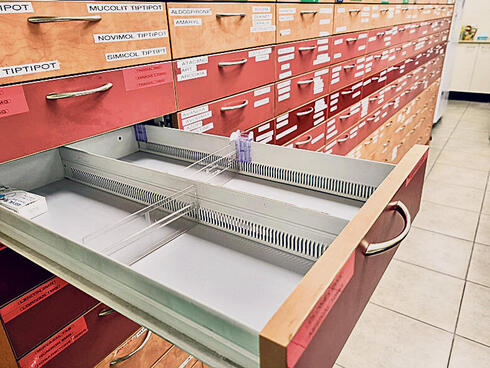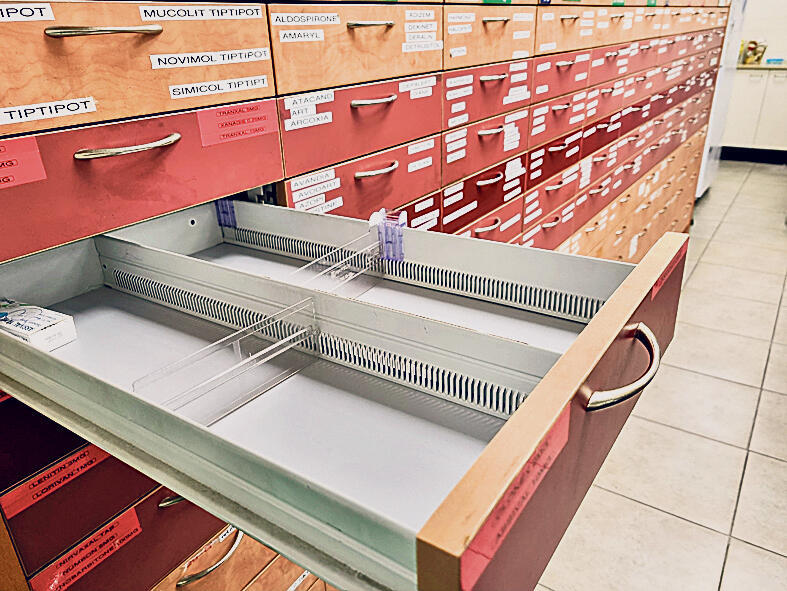
ISRAEL AT WAR
Demand for psychiatric drugs soars by 30% amid Israel's war with Hamas
The demand for psychiatric drugs and sedatives has surged due to a rise in the number of patients and concerns about future medication shortages, which HMOs say is unnecessary.
The increased demand for psychiatric drugs and sedatives has risen sharply in the past two weeks due to Israel’s ongoing war with Hamas. David Pappo, Chairman of the Israeli Pharmacists Association, explained that "there is no increase in the prescription of psychiatric medication, but there is a noticeable increase in the number of patients who request prescriptions for two to three months. They are stockpiling out of fear of a shortage." According to Pappo, there has been a 10-20% rise in demand in the past week compared to the previous month.
Patients' concerns are not unfounded, said a senior official who explained that concerns are reinforced by several factors: the chaos of recent days, a dramatic decrease in the number of flights (most medications are transported by air), and bureaucratic difficulties within the Ministry of Health.
Sharon Elmakias, the head of the Mental Health Division at the Health Fund Meuhedet, says there has been a significant increase in demand by 30% in the past two weeks, and says, "The increase in demand is not only due to increased medication consumption; just as people are stockpiling essentials in supermarkets, they also feel the need to stock up on medication just in case it's not available." Elmakias emphasizes that "It is important to note that there is no shortage of medications, and at this stage, we can meet the demand, so there is no need to rush and hoard medications unnecessarily."
Pappo sheds light on another phenomenon: an increase in the use of non-prescription psychiatric drugs, such as anxiety and depression medication. "Patients describe their mental state to pharmacists to get the right drug, and from there, we obtain this information," he explains. These medications are not just for anxiety and depression but also for sleeping, a phenomenon that has grown among Israelis since the war began. Pappo notes that the lack of sleep is "not just due to anxiety but also because of endless screen time." He concludes, "It's not an isolated terrorist attack. Almost everyone is connected to someone who has been killed or kidnapped. This time, we almost all know at least one of these people and take it to heart. There's tension and nervousness. It's clear that people want to reduce the pressure."
Meuhedet explains that the surge in demand applies to both prescription and over-the-counter drugs. Are these new patients experiencing mental health challenges due to the war? A representative from the health funds explained that, "It's usually challenging, if not impossible, to check since all psychiatric appointments are typically full, and demand was at 100% even before the war, so there's no real way to measure excess demand." However, Dr. Zvi Fishel, the head of the National Mental Health Council, said that "it is clear that there are new patients. Those in shelters for the displaced, people approach clinics or hospitals. But at this stage, it is very difficult to estimate the number. The acute response to trauma, called 'acute stress response,' manifests in anxiety and issues sleeping, so it's not surprising that there is an increase in demand for sedatives," Fishel explains.
Fishel also has a recommendation for the public: "The natural tendency in this situation is to stay at home and protect your family. Our recommendation is to return to functioning normally as much as possible. Routine is a protective factor, and action is an effective coping mechanism."
Dr. Gilad Bodenheimer, the head of Mental Health Services at the Ministry of Health, emphasizes Fishel's words: "The event is not psychiatric but psychological. There is no intention and no need to push psychiatric medications. But naturally, all the people who are experiencing psychological distress due to the difficult events receive initial medical assistance, mostly in the form of conversation." He adds that "on the other hand, I assume that there is an increase in demand for therapy. But the Ministry of Health is busy trying to provide the proper responses for people because we are dealing with unprecedented needs, and we have already started from a low point in terms of mental health regarding personnel, for example. We are inventing solutions for situations we never imagined."
Bodenheimer mentioned that the Ministry of Health managed to compile lists of immediate victims of the October 7th attacks, and they have already initiated conversations with them and offered assistance. "There is a protocol, and we operate based on the names that reach us," he said.
Regarding the future, Bodenheimer adds that "We need to focus on strengthening the mental health system as a whole, strengthening communities and using existing community resources to overcome this situation. Additionally, we need to strengthen the primary healthcare system (family doctors and pediatricians) and expand community systems. We need to make significant changes while expanding the workforce and tailor treatments to match each individual. We do not want and cannot send ten million citizens to a psychiatrist, and there is no need for it. Therefore, we must create diverse and community-based and primary care providers (family doctor and pediatrician)."















